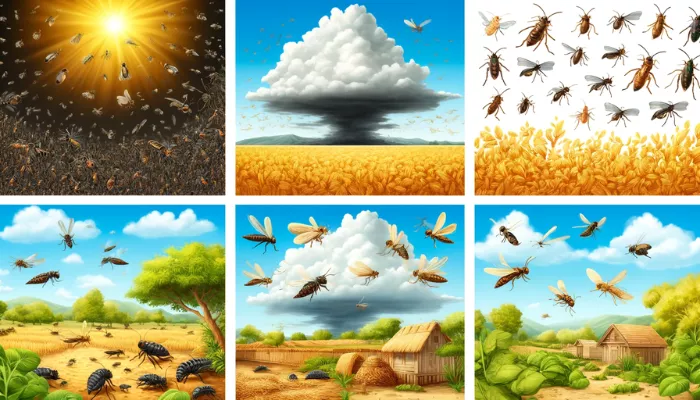Have you ever wondered what to call a group of locusts? These fascinating insects, known for their swarming behavior, have unique collective nouns that add a touch of magic to their identity. Let’s dive into the world of locusts and discover the different collective nouns used to describe them!
Collective Noun For Locusts in Table
| Noun | Collective Noun | Definition | Example |
|---|---|---|---|
| Locusts | Plague | A large swarm | A plague of locusts devoured the crops in the field. |
| Locusts | Swarm | A group in movement | A swarm of locusts darkened the sky. |
| Locusts | Cloud | A mass in the air | A cloud of locusts descended upon the village. |
| Locusts | Horde | A large group | The farmers watched a horde of locusts approaching. |
| Locusts | Cluster | A tight group | A cluster of locusts rested on the tree branches. |
Detailed Explanations and Examples for Locusts
1. Plague
Explanation: The term plague is often used to describe a very large group of locusts that can cause significant damage to crops and vegetation.
Examples:
- A plague of locusts covered the fields, leaving nothing behind.
- The village faced a severe problem when a plague of locusts arrived.
- The farmers worked together to combat the plague of locusts.
2. Swarm
Explanation: Swarm is a common term for a large group of locusts moving together, often in flight.
Examples:
- A swarm of locusts moved across the sky, creating a shadow over the town.
- The sound of the swarm of locusts was deafening.
- People rushed indoors as a swarm of locusts approached.
3. Cloud
Explanation: Cloud is used to describe a dense group of locusts in the air, resembling a cloud.
Examples:
- A cloud of locusts blocked the sun, making it look like night.
- The pilot had to navigate through a thick cloud of locusts.
- As the cloud of locusts flew over the city, people watched in awe.
4. Horde
Explanation: The term horde refers to a very large and often threatening group of locusts.
Examples:
- A horde of locusts advanced towards the farmland, causing panic.
- The relentless horde of locusts left destruction in their wake.
- The farmers prepared to defend their crops from the horde of locusts.
5. Cluster
Explanation: Cluster describes a tight, compact group of locusts usually at rest.
Examples:
- A cluster of locusts gathered on the tree, munching on the leaves.
- The cluster of locusts was seen resting on the fence.
- Scientists observed the behavior of a cluster of locusts.
Quiz Time
1. What is a large swarm of locusts called?
- A) Group
- B) Pack
- C) Plague
- D) Gang
2. Which term describes locusts in movement?
- A) Swarm
- B) Herd
- C) School
- D) Flock
3. What is a dense mass of locusts in the air referred to as?
- A) Puff
- B) Cloud
- C) Gust
- D) Breeze
4. Which term is used for a very large and often threatening group of locusts?
- A) Team
- B) Squad
- C) Horde
- D) Band
5. What do we call a tight group of locusts usually at rest?
- A) Cluster
- B) Bunch
- C) Collection
- D) Bundle
Quiz Answers
- C) Plague
- A) Swarm
- B) Cloud
- C) Horde
- A) Cluster
Conclusion
Understanding the different collective nouns for locusts helps us appreciate the fascinating aspects of these insects. Each term offers a unique way to describe their behavior and appearance, making the study of locusts both interesting and educational.

